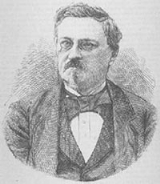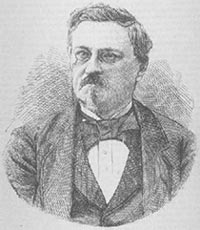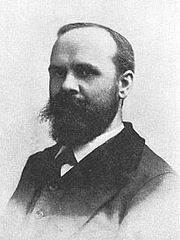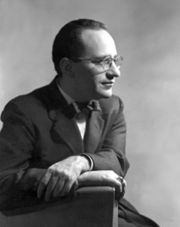
Market anarchism
Encyclopedia
Free-market anarchism (sometimes called simply market anarchism, and occasionally libertarian anarchism or propertarian anarchism) refers to an individualist anarchist
philosophy in which monopoly of force held by government would be replaced by a competitive market of non-monopolistic organizations providing security, justice, and other defense services. A market would exist where providers of security and law compete for voluntarily paying customers that wish to receive the services rather than individuals being taxed without their consent and assigned a monopoly provider of force. The belief, among free-market anarchists, is that this competition thus will tend to produce cheaper and higher-quality legal and police services including "a high-quality good of impartial, efficient umpiring of conflicting rights claims".
The term describes the type of anarchy
proposed by anarcho-capitalism
and the philosophies that prefigurated it. In this sense, notable proponents of free-market anarchism include Benjamin Tucker
, Lysander Spooner
, Murray Rothbard
and David D. Friedman
. Free-market anarchism has been traced as far back as the 1840s, as conceived by individuals such as Julius Faucher
and Gustave de Molinari
.
 One of the first individuals to propose the concept of market protection of individual liberty and property, i.e. free-market anarchism, was France's Jakob Mauvillon
One of the first individuals to propose the concept of market protection of individual liberty and property, i.e. free-market anarchism, was France's Jakob Mauvillon
in the 18th century. Later, in the 1840s, Julius Faucher
and Gustave de Molinari
advocated the same. Molinari, in his essay The Production of Security, argued, "No government should have the right to prevent another government from going into competition with it, or to require consumers of security to come exclusively to it for this commodity." Molinari argued that the monopoly on security causes high prices and low quality. He says in Les Soirées: "The monopoly of government is no better than any other. One does not govern well and, especially not cheaply, when one has no competition to fear, when the ruled are deprived of the right of freely choosing their rulers...The production of security inevitably becomes costly and bad when it is organized as a monopoly." The brunt of Molinari's argument for free-market anarchism is based in economics rather than on moral opposition to the state.
in the United States theorized free-market anarchism: "defense is a service like any other service; that it is labor both useful and desired, and therefore an economic commodity subject to the law of supply and demand; that in a free market this commodity would be furnished at the cost of production; that, competition prevailing, patronage would go to those who furnished the best article at the lowest price; that the production and sale of this commodity are now monopolized by the State; and that the State, like almost all monopolists, charges exorbitant prices." He noted that the anarchism he proposed would include prisons and military. Later, in the mid 20th century, free-market anarchism was revived by Murray Rothbard
. David D. Friedman
proposes a form of free-market anarchism where in addition to security being provided by the market, the law itself is produced by the market.
Murray Rothbard
and other natural rights
theorists hold strongly to the central libertarian
non-aggression axiom, while other free-market anarchists such as David D. Friedman
utilize consequentialist theories such as utilitarianism
. Some Agorists, anarcho-capitalists of the Rothbardian tradition, and voluntaryists are propertarian market anarchists who consider property rights to be natural rights deriving from the primary right of self-ownership
.
Market anarchists have varying views on how to go about eliminating the state. Rothbard advocates the use of any non-immoral tactic available to bring about liberty. Agorists
followers of the philosophy of Samuel Edward Konkin III
propose to eliminate the state by practising tax resistance
and by the use of illegal black market strategies called counter-economics
until the security functions of the state can be replaced by free market competitors.
 Benjamin Tucker
Benjamin Tucker
originally subscribed to the idea of land ownership associated with Mutualism
, which does not grant that this creates property in land, but holds that when people customarily use given land (and in some versions goods), other people should respect that use or possession
. But, when that use stops, ownership is no longer recognized, unlike with property
. The mutualist
theory holds that the stopping of use or occupying land reverts it to the commons or to an unowned condition, and makes it available for anyone that wishes to use it. Therefore, there would be no market in land that is not in use. However, Tucker later abandoned natural rights theory and said that land ownership is legitimately transferred through force unless specified otherwise by contracts: "Man's only right to land is his might over it. If his neighbor is mightier than he and takes the land from him, then the land is his neighbor's, until the latter is dispossessed by one mightier still." He expected, however, that individuals would come to the realization that the "occupancy and use" was a "generally trustworthy guiding principle of action," and that individuals would likely contract to an occupancy and use policy.
 Classical liberal John Locke
Classical liberal John Locke
argues that, as people mix their own labor with unowned resources, they make those resources their property
. People can acquire new property by labor on unowned resources or trade for created goods. In accordance with Lockean philosophy, Rothbardian free-market anarchists believe that property may only originate by being the product of labor, and may then only legitimately change hands by trade or gift. They derive this homestead principle
from the principle of self-ownership
. However, Locke had a "Proviso
" which says that the appropriator of resources must leave "enough and as good in common...to others." Rothbardian market anarchists do not agree with this proviso, holding that the individual may originally appropriate as much as he wishes through mixing his labor, and it remains his property until he chooses otherwise. They term this as "neo-Lockean". Libertarians see this as consistent with their opposition to initiatory coercion, since only land that is unowned can be taken. If something is unowned, there is no one the original appropriator is initiating coercion against. They do not think mere claim creates ownership, but rather the mixing of one's labor with the unowned, as for example setting up a farm. Anarcho-capitalists accept voluntary forms of common ownership
, which means property open to all individuals to access. Samuel Edward Konkin III
, the founder of agorism
is also a Rothbardian.
, who argued that a competitive legal system would evolve toward a monopoly government - even without violating individuals rights in the process. Many market anarchists, including Roy A. Childs and Murray N. Rothbard, have rejected Nozick's conclusion (though Childs himself subsequently rejected anarchism).
Individualist anarchism
Individualist anarchism refers to several traditions of thought within the anarchist movement that emphasize the individual and his or her will over external determinants such as groups, society, traditions, and ideological systems. Individualist anarchism is not a single philosophy but refers to a...
philosophy in which monopoly of force held by government would be replaced by a competitive market of non-monopolistic organizations providing security, justice, and other defense services. A market would exist where providers of security and law compete for voluntarily paying customers that wish to receive the services rather than individuals being taxed without their consent and assigned a monopoly provider of force. The belief, among free-market anarchists, is that this competition thus will tend to produce cheaper and higher-quality legal and police services including "a high-quality good of impartial, efficient umpiring of conflicting rights claims".
The term describes the type of anarchy
Anarchy
Anarchy , has more than one colloquial definition. In the United States, the term "anarchy" typically is meant to refer to a society which lacks publicly recognized government or violently enforced political authority...
proposed by anarcho-capitalism
Anarcho-capitalism
Anarcho-capitalism is a libertarian and individualist anarchist political philosophy that advocates the elimination of the state in favour of individual sovereignty in a free market...
and the philosophies that prefigurated it. In this sense, notable proponents of free-market anarchism include Benjamin Tucker
Benjamin Tucker
Benjamin Ricketson Tucker was a proponent of American individualist anarchism in the 19th century, and editor and publisher of the individualist anarchist periodical Liberty.-Summary:Tucker says that he became an anarchist at the age of 18...
, Lysander Spooner
Lysander Spooner
Lysander Spooner was an American individualist anarchist, political philosopher, Deist, abolitionist, supporter of the labor movement, legal theorist, and entrepreneur of the nineteenth century. He is also known for competing with the U.S...
, Murray Rothbard
Murray Rothbard
Murray Newton Rothbard was an American author and economist of the Austrian School who helped define capitalist libertarianism and popularized a form of free-market anarchism he termed "anarcho-capitalism." Rothbard wrote over twenty books and is considered a centrally important figure in the...
and David D. Friedman
David D. Friedman
David Director Friedman is an American economist, author, and Right-libertarian theorist. He is known as a leader in anarcho-capitalist political theory, which is the subject of his most popular book, The Machinery of Freedom...
. Free-market anarchism has been traced as far back as the 1840s, as conceived by individuals such as Julius Faucher
Julius Faucher
Julius Faucher was a German journalist and a significant advocate of Liberalism and Free Trade...
and Gustave de Molinari
Gustave de Molinari
Gustave de Molinari was an economist born in Belgium associated with French laissez-faire liberal economists such as Frédéric Bastiat and Hippolyte Castille. Living in Paris, in the 1840s, he took part in the "Ligue pour la Liberté des Échanges" , animated by Frédéric Bastiat...
.
Origins

Jakob Mauvillon
Jakob Mauvillon , son of Eleazar Mauvillon, was an 18th century figure in German liberalism. He was of French Huguenot descent. He was a professor of politics at Brunswick...
in the 18th century. Later, in the 1840s, Julius Faucher
Julius Faucher
Julius Faucher was a German journalist and a significant advocate of Liberalism and Free Trade...
and Gustave de Molinari
Gustave de Molinari
Gustave de Molinari was an economist born in Belgium associated with French laissez-faire liberal economists such as Frédéric Bastiat and Hippolyte Castille. Living in Paris, in the 1840s, he took part in the "Ligue pour la Liberté des Échanges" , animated by Frédéric Bastiat...
advocated the same. Molinari, in his essay The Production of Security, argued, "No government should have the right to prevent another government from going into competition with it, or to require consumers of security to come exclusively to it for this commodity." Molinari argued that the monopoly on security causes high prices and low quality. He says in Les Soirées: "The monopoly of government is no better than any other. One does not govern well and, especially not cheaply, when one has no competition to fear, when the ruled are deprived of the right of freely choosing their rulers...The production of security inevitably becomes costly and bad when it is organized as a monopoly." The brunt of Molinari's argument for free-market anarchism is based in economics rather than on moral opposition to the state.
Development
In the 19th century, Benjamin TuckerBenjamin Tucker
Benjamin Ricketson Tucker was a proponent of American individualist anarchism in the 19th century, and editor and publisher of the individualist anarchist periodical Liberty.-Summary:Tucker says that he became an anarchist at the age of 18...
in the United States theorized free-market anarchism: "defense is a service like any other service; that it is labor both useful and desired, and therefore an economic commodity subject to the law of supply and demand; that in a free market this commodity would be furnished at the cost of production; that, competition prevailing, patronage would go to those who furnished the best article at the lowest price; that the production and sale of this commodity are now monopolized by the State; and that the State, like almost all monopolists, charges exorbitant prices." He noted that the anarchism he proposed would include prisons and military. Later, in the mid 20th century, free-market anarchism was revived by Murray Rothbard
Murray Rothbard
Murray Newton Rothbard was an American author and economist of the Austrian School who helped define capitalist libertarianism and popularized a form of free-market anarchism he termed "anarcho-capitalism." Rothbard wrote over twenty books and is considered a centrally important figure in the...
. David D. Friedman
David D. Friedman
David Director Friedman is an American economist, author, and Right-libertarian theorist. He is known as a leader in anarcho-capitalist political theory, which is the subject of his most popular book, The Machinery of Freedom...
proposes a form of free-market anarchism where in addition to security being provided by the market, the law itself is produced by the market.
Ideological variance
Beyond their agreeing that security should be privately provided by market-based entities, proponents of free-market anarchism differ in other details and aspects of their philosophies, particularly justification, tactics and property rights.Murray Rothbard
Murray Rothbard
Murray Newton Rothbard was an American author and economist of the Austrian School who helped define capitalist libertarianism and popularized a form of free-market anarchism he termed "anarcho-capitalism." Rothbard wrote over twenty books and is considered a centrally important figure in the...
and other natural rights
Natural rights
Natural and legal rights are two types of rights theoretically distinct according to philosophers and political scientists. Natural rights are rights not contingent upon the laws, customs, or beliefs of any particular culture or government, and therefore universal and inalienable...
theorists hold strongly to the central libertarian
Libertarianism
Libertarianism, in the strictest sense, is the political philosophy that holds individual liberty as the basic moral principle of society. In the broadest sense, it is any political philosophy which approximates this view...
non-aggression axiom, while other free-market anarchists such as David D. Friedman
David D. Friedman
David Director Friedman is an American economist, author, and Right-libertarian theorist. He is known as a leader in anarcho-capitalist political theory, which is the subject of his most popular book, The Machinery of Freedom...
utilize consequentialist theories such as utilitarianism
Utilitarianism
Utilitarianism is an ethical theory holding that the proper course of action is the one that maximizes the overall "happiness", by whatever means necessary. It is thus a form of consequentialism, meaning that the moral worth of an action is determined only by its resulting outcome, and that one can...
. Some Agorists, anarcho-capitalists of the Rothbardian tradition, and voluntaryists are propertarian market anarchists who consider property rights to be natural rights deriving from the primary right of self-ownership
Self-ownership
Self-ownership is the concept of property in one's own person, expressed as the moral or natural right of a person to be the exclusive controller of his own body and life. According to G...
.
Market anarchists have varying views on how to go about eliminating the state. Rothbard advocates the use of any non-immoral tactic available to bring about liberty. Agorists
Agorism
Agorism is a political philosophy founded by Samuel Edward Konkin III and developed with contributions by J. Neil Schulman that holds as its ultimate goal bringing about a society in which all "relations between people are voluntary exchanges – a free market." The term comes from the Greek...
followers of the philosophy of Samuel Edward Konkin III
Samuel Edward Konkin III
Samuel Edward Konkin III was the author of the New Libertarian Manifesto and a proponent of the political philosophy which he called agorism. Agorism is a leftward evolution of anarcho-capitalism, and subset of market anarchism...
propose to eliminate the state by practising tax resistance
Tax resistance
Tax resistance is the refusal to pay tax because of opposition to the government that is imposing the tax or to government policy.Tax resistance is a form of civil disobedience and direct action...
and by the use of illegal black market strategies called counter-economics
Counter-economics
Counter-economics is a term originally used by Samuel Edward Konkin III and J. Neil Schulman, libertarian activists and theorists. Konkin defined it as "the study and/or practice of all peaceful human action which is forbidden by the State." The term is short for "counter-establishment economics"...
until the security functions of the state can be replaced by free market competitors.
Tuckerites

Benjamin Tucker
Benjamin Ricketson Tucker was a proponent of American individualist anarchism in the 19th century, and editor and publisher of the individualist anarchist periodical Liberty.-Summary:Tucker says that he became an anarchist at the age of 18...
originally subscribed to the idea of land ownership associated with Mutualism
Mutualism (economic theory)
Mutualism is an anarchist school of thought that originates in the writings of Pierre-Joseph Proudhon, who envisioned a society where each person might possess a means of production, either individually or collectively, with trade representing equivalent amounts of labor in the free market...
, which does not grant that this creates property in land, but holds that when people customarily use given land (and in some versions goods), other people should respect that use or possession
Ownership
Ownership is the state or fact of exclusive rights and control over property, which may be an object, land/real estate or intellectual property. Ownership involves multiple rights, collectively referred to as title, which may be separated and held by different parties. The concept of ownership has...
. But, when that use stops, ownership is no longer recognized, unlike with property
Property
Property is any physical or intangible entity that is owned by a person or jointly by a group of people or a legal entity like a corporation...
. The mutualist
Mutualism (economic theory)
Mutualism is an anarchist school of thought that originates in the writings of Pierre-Joseph Proudhon, who envisioned a society where each person might possess a means of production, either individually or collectively, with trade representing equivalent amounts of labor in the free market...
theory holds that the stopping of use or occupying land reverts it to the commons or to an unowned condition, and makes it available for anyone that wishes to use it. Therefore, there would be no market in land that is not in use. However, Tucker later abandoned natural rights theory and said that land ownership is legitimately transferred through force unless specified otherwise by contracts: "Man's only right to land is his might over it. If his neighbor is mightier than he and takes the land from him, then the land is his neighbor's, until the latter is dispossessed by one mightier still." He expected, however, that individuals would come to the realization that the "occupancy and use" was a "generally trustworthy guiding principle of action," and that individuals would likely contract to an occupancy and use policy.
Rothbardians

John Locke
John Locke FRS , widely known as the Father of Liberalism, was an English philosopher and physician regarded as one of the most influential of Enlightenment thinkers. Considered one of the first of the British empiricists, following the tradition of Francis Bacon, he is equally important to social...
argues that, as people mix their own labor with unowned resources, they make those resources their property
Property
Property is any physical or intangible entity that is owned by a person or jointly by a group of people or a legal entity like a corporation...
. People can acquire new property by labor on unowned resources or trade for created goods. In accordance with Lockean philosophy, Rothbardian free-market anarchists believe that property may only originate by being the product of labor, and may then only legitimately change hands by trade or gift. They derive this homestead principle
Homestead principle
The homestead principle in law is the concept that one can gain ownership of a natural thing that currently has no owner by using it or building something out of it...
from the principle of self-ownership
Self-ownership
Self-ownership is the concept of property in one's own person, expressed as the moral or natural right of a person to be the exclusive controller of his own body and life. According to G...
. However, Locke had a "Proviso
Lockean proviso
The Lockean Proviso is a portion of John Locke's labor theory of property which says that though individuals have a right to acquire private property from nature, that they must leave "enough and as good in common...to others."...
" which says that the appropriator of resources must leave "enough and as good in common...to others." Rothbardian market anarchists do not agree with this proviso, holding that the individual may originally appropriate as much as he wishes through mixing his labor, and it remains his property until he chooses otherwise. They term this as "neo-Lockean". Libertarians see this as consistent with their opposition to initiatory coercion, since only land that is unowned can be taken. If something is unowned, there is no one the original appropriator is initiating coercion against. They do not think mere claim creates ownership, but rather the mixing of one's labor with the unowned, as for example setting up a farm. Anarcho-capitalists accept voluntary forms of common ownership
Common ownership
Common ownership is a principle according to which the assets of an enterprise or other organization are held indivisibly rather than in the names of the individual members or by a public institution such as a governmental body. It is therefore in contrast to public ownership...
, which means property open to all individuals to access. Samuel Edward Konkin III
Samuel Edward Konkin III
Samuel Edward Konkin III was the author of the New Libertarian Manifesto and a proponent of the political philosophy which he called agorism. Agorism is a leftward evolution of anarcho-capitalism, and subset of market anarchism...
, the founder of agorism
Agorism
Agorism is a political philosophy founded by Samuel Edward Konkin III and developed with contributions by J. Neil Schulman that holds as its ultimate goal bringing about a society in which all "relations between people are voluntary exchanges – a free market." The term comes from the Greek...
is also a Rothbardian.
Criticisms
A well-known critique of free market anarchism is by Robert NozickRobert Nozick
Robert Nozick was an American political philosopher, most prominent in the 1970s and 1980s. He was a professor at Harvard University. He is best known for his book Anarchy, State, and Utopia , a right-libertarian answer to John Rawls's A Theory of Justice...
, who argued that a competitive legal system would evolve toward a monopoly government - even without violating individuals rights in the process. Many market anarchists, including Roy A. Childs and Murray N. Rothbard, have rejected Nozick's conclusion (though Childs himself subsequently rejected anarchism).
External links
- Molinari Institute - An institute operated by Roderick LongRoderick LongRoderick Tracy Long is a professor of philosophy at Auburn University and libertarian anarchist blogger. He also serves as a senior scholar for the Ludwig von Mises Institute, an editor of the Journal of Ayn Rand Studies, director and president of the Molinari Institute, and an advisory panel...
that offers online resources relating to all forms of market anarchism - LewRockwell.com A site hosting anarcho-capitalist articles, run by Lew RockwellLew RockwellLlewellyn Harrison "Lew" Rockwell, Jr. is an American libertarian political commentator, activist, proponent of the Austrian School of economics, and chairman of the Ludwig von Mises Institute.-Life and work:...
with the slogan "anti-state, anti-war, pro-market," from a culturally conservative perspective. - Market Anarchy Explained
- Anti-State.com - This "online center for market anarchism," run by Jeremy Sapienza has one of the more active forums and an archive of theoretical and practical articles from notable anarcho-capitalists.
- Strike The Root - A voluntaryist website featuring essays, news, and a forum.
- Center for a Stateless Society - Building awareness of the market anarchist alternative.

